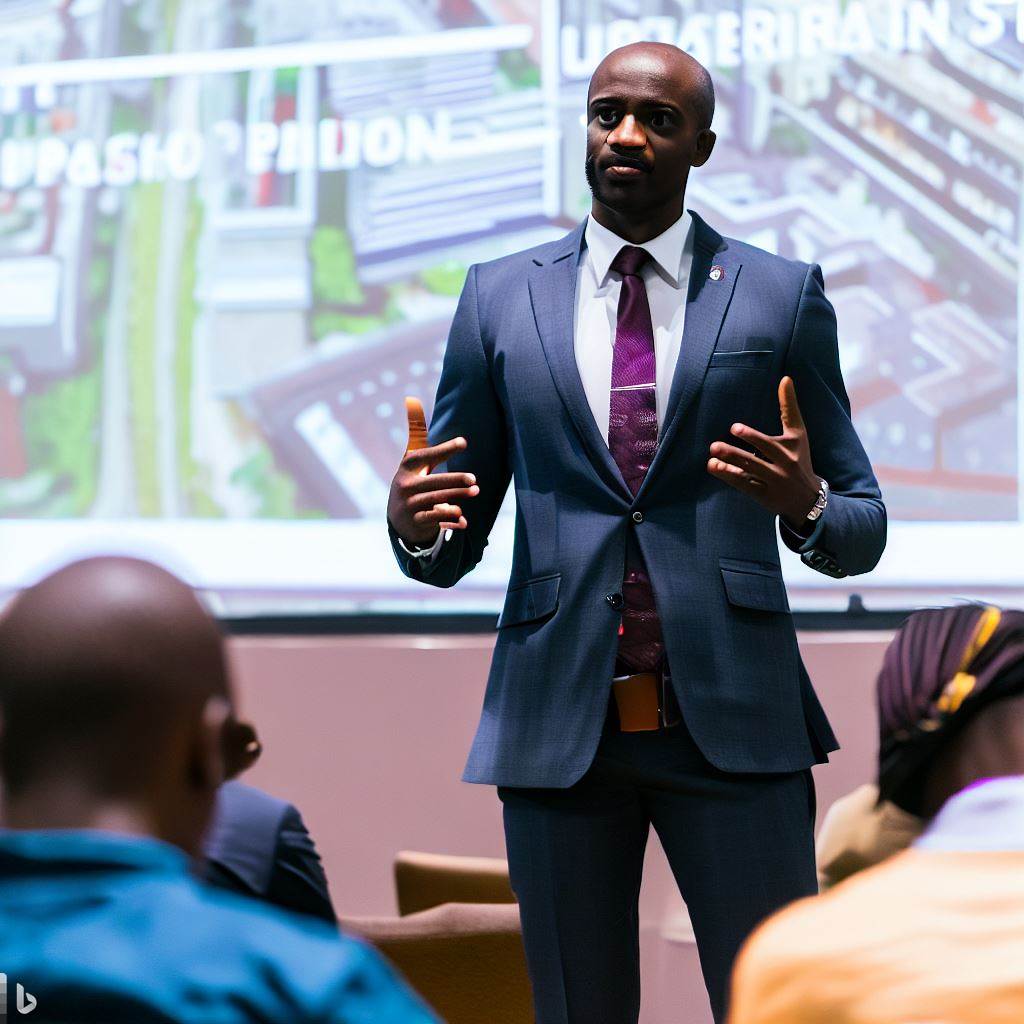Introduction
Urban and regional planning is the process of designing and organizing cities and their surroundings to improve the quality of life for their residents.
It involves creating sustainable communities and addressing issues such as housing, transportation, and land use.
Ethical practices are of utmost importance in this field as they ensure planners act responsibly and in the best interest of the communities they serve.
Ethical behavior promotes transparency, accountability, and fairness in decision-making processes.
In Nigeria, urban and regional planning is crucial due to rapid urbanization and the associated challenges.
The country’s urban areas are characterized by inadequate infrastructure, environmental degradation, and social inequalities.
Planners in Nigeria face complex ethical dilemmas, given the pressure to deliver projects quickly, limited resources, and the influence of political and economic interests.
Therefore, adherence to ethical practices is essential in order to address these challenges effectively and sustainably.
Ethics in Urban and Regional Planning
A. Definition of ethics in the context of planning
Ethics in urban and regional planning refers to the moral principles and values that guide planners in their decision-making process.
It involves considering the potential impacts of planning decisions on individuals, communities, and the environment.
B. Importance of ethical practices for planners
- Ethical practices ensure responsible and sustainable development and protect the interests of all stakeholders.
- They promote transparency, fairness, and accountability in the planning process.
- Planners who adhere to ethical principles enhance their professional credibility and public trust.
C. Ethical principles to guide urban and regional planners in Nigeria
- Equity: Planners should strive for fairness and justice in the distribution of resources and opportunities.
- Sustainability: Planners must consider the long-term impact of their decisions on the environment and future generations.
- Transparency: Planners should ensure openness and clear communication about the planning process and decision-making.
- Participation: Planners should actively engage citizens and stakeholders in the planning process, seeking their input and involving them in decision-making.
- Integrity: Planners must uphold the highest professional and ethical standards, avoiding conflicts of interest and acting in the best interest of the public.
- Professional competence: Planners should continuously enhance their knowledge and skills to provide quality planning services.
- Collaboration: Planners should work collaboratively with other professionals and stakeholders to achieve common goals and resolve conflicts.
- Privacy and confidentiality: Planners must respect and protect the privacy of individuals and ensure the confidentiality of sensitive information.
Ethical urban and regional planning is crucial for sustainable and inclusive development in Nigeria. Adhering to these principles helps create equitable, resilient environments.
Planners must respect diverse needs, prioritize long-term growth, and gain public trust to address challenges.
Continuing ethical reflection and learning enhance planning’s positive impact on Nigerian communities.
Read: Exploring the Top Urban Planning Projects in Nigeria
Challenges to Ethical Practices in Nigeria:
A. Lack of clear regulatory framework
The absence of a well-defined regulatory framework poses a significant challenge to ethical practices in urban and regional planning in Nigeria.
Without clear guidelines and standards, planners may engage in unethical practices without facing any consequences.
The lack of a regulatory framework leads to a lack of accountability and transparency in the planning process.
It becomes difficult to monitor and evaluate the ethical behavior of planners in the absence of clear regulations.
B. Corruption and bribery
Corruption and bribery are rampant challenges that hinder ethical practices among urban and regional planners in Nigeria.
Planners, driven by personal gain, may accept bribes to manipulate planning decisions or favor certain individuals or organizations.
The presence of corruption undermines the integrity of the planning profession and erodes public trust in the planning process.
Bribery and corruption lead to distorted priorities, with planning decisions being influenced by financial incentives rather than public interest.
C. Inadequate resources and infrastructure
Limited resources and inadequate infrastructure contribute to the challenges faced by ethical planners in Nigeria.
Planners often work in resource-constrained environments, making it difficult to adhere to ethical standards and deliver quality planning services.
Without sufficient resources, planners may compromise on ethical principles to meet project deadlines or satisfy the demands of stakeholders.
Inadequate infrastructure, such as outdated technology or limited access to information, hinders effective planning processes and increases the likelihood of unethical practices.
D. Political interference
Political interference poses a significant threat to ethical practices in urban and regional planning in Nigeria.
Planners may face pressure from political leaders to prioritize their interests or make planning decisions that align with a particular political agenda.
Political interference compromises the independent judgment of planners and undermines their ability to act in the best interest of the public.
Planning decisions driven by political interference often overlook long-term sustainability and equitable development, further exacerbating ethical challenges.
In essence, ethical practices in urban and regional planning in Nigeria face several challenges that hinder the profession’s integrity and effectiveness.
The lack of a clear regulatory framework, coupled with corruption, inadequate resources and infrastructure, and political interference, undermines the ethical conduct of planners.
To address these challenges, it is imperative to establish a robust regulatory framework, strengthen anti-corruption measures, allocate adequate resources, and ensure planners are shielded from political interference.
Only by addressing these challenges can Nigeria promote ethical practices and strive towards sustainable and inclusive urban and regional development.
Read: Education and Skills Needed for Urban Planning in Nigeria

Ethics Guidelines and Codes of Conduct for Urban and Regional Planners in Nigeria
A. Review of existing guidelines and codes
The Institute of Town Planners of Nigeria (ITPN) has established a Code of Conduct for its members.
The Code provides guidelines for professional behavior, responsibilities, and ethical standards for planners. It emphasizes the obligation of planners to serve the public interest and protect the environment.
Urban and regional planners are expected to prioritize the needs and aspirations of the community.
Furthermore, the Code promotes transparency, integrity, and accountability in the planning process.
It makes clear that planners should avoid conflicts of interest that may compromise their professional judgment.
The Code also addresses issues such as respect for cultural diversity and social justice.
B. Analysis of their effectiveness
The existing guidelines and codes have played a significant role in promoting ethical practices among planners.
They provide a framework for professional conduct and ensure planners adhere to high ethical standards.
By emphasizing the public interest and environmental protection, they contribute to sustainable planning.
However, there are instances where these guidelines are not strictly followed, leading to ethical lapses.
Some planners may prioritize personal interests or overlook the needs of marginalized communities.
Enforcement mechanisms also need improvement to ensure stricter compliance with the codes of conduct.
C. Recommendations for improvement
- Regular training and workshops should be conducted to create awareness of ethical responsibilities.
- Strengthening the monitoring and enforcement mechanisms will enhance compliance with the codes of conduct.
- Creating a platform for reporting ethical violations and providing protection to whistleblowers is essential.
- Engagement with communities and stakeholders should be prioritized to ensure inclusivity in decision-making processes.
- Collaboration with other professional bodies can help address multidisciplinary ethical challenges.
- Updating the existing guidelines to reflect evolving ethical issues and global best practices is crucial.
- Incorporating technology and digital tools in ethical practices can improve transparency and efficiency.
In general, the existing guidelines and codes of conduct for urban and regional planners in Nigeria provide a strong foundation for ethical practices.
However, there is still room for improvement. By enhancing enforcement mechanisms, conducting regular training, and engaging with the community, planners can ensure their actions align with ethical standards.
Collaborating with other professional bodies and embracing technological advancements can also contribute to better ethical practices in the field of urban and regional planning.
Read: Demand and Job Prospects for Urban Planners in Nigeria
Best Practices in Ethical Urban and Regional Planning
A. Transparency and accountability
Urban and regional planners in Nigeria must adhere to high standards of transparency and accountability in their practices.
This involves openly sharing information, decision-making processes, and resource allocation.
B. Public participation and engagement
In order to ensure ethical practices, planners must actively involve the public in the planning process.
This includes seeking input, addressing concerns, and fostering inclusive dialogue.
C. Sustainable development and environmental stewardship
Planners should prioritize sustainable development practices and engage in environmental stewardship.
This includes promoting green infrastructure, energy efficiency, and conservation.
D. Social equity and inclusivity
Inclusive planning is crucial to address social inequities. Planners must work towards equitable access to resources, services, and amenities for all communities, including marginalized groups.
E. Professional integrity and continuous learning
Urban and regional planners in Nigeria must prioritize ethical standards and ongoing professional growth.
Transparent, accountable decision-making builds trust, while involving the public ensures diverse perspectives shape projects.
Planners should integrate sustainability, encouraging green infrastructure and energy efficiency. Environmental stewardship safeguards ecosystems.
Equity is vital; planners must address disparities in resources and access to create inclusive communities.
Maintaining integrity—being honest, objective, and confidential—is crucial.
Continuous learning through professional development keeps planners informed about trends and best practices, enabling top-tier planning services.
In short, practicing ethical urban and regional planning in Nigeria requires transparency, public participation, sustainability, social equity, and professional integrity.
By following these best practices, planners can contribute to creating sustainable, inclusive, and livable communities.
Ethical planning ensures that the needs and aspirations of the present and future generations are taken into consideration, fostering a more equitable and sustainable future for Nigeria.
Read: The Influence of Urban Planners on Nigeria’s Cityscape
Case Studies of Ethical Urban and Regional Planning in Nigeria
A. Successful projects that uphold ethical practices
- The Lagos-Ibadan Expressway Expansion Project: This project aimed to improve the transportation infrastructure between Lagos and Ibadan, reducing travel time and enhancing connectivity. It adhered to ethical practices by conducting thorough environmental and social impact assessments.
- Abuja Green City: This sustainable urban development project in Abuja focused on creating a green and livable city. It upheld ethical practices by incorporating sustainable design principles, promoting green spaces, and preserving natural resources.
- The Eko Atlantic City Project: This ambitious development initiative aimed to construct a new city on reclaimed land in Lagos. It followed ethical practices by considering the environmental impact, involving local communities, and adhering to transparent planning processes.
B. Lessons learned from these case studies
- Environmental Considerations: These successful projects highlight the importance of assessing and mitigating environmental impacts during the planning stage. It is crucial for planners in Nigeria to prioritize sustainable development and preserve natural resources.
- Community Participation: The case studies emphasized the significance of involving local communities in the planning process. By considering their needs and concerns, planners can build trust, ensure inclusivity, and create projects that benefit the whole community.
- Transparency and Accountability: The ethical practices showcased in these projects underscore the need for transparency and accountability. Planners should maintain open lines of communication, share relevant information, and involve stakeholders in decision-making processes.
- Sustainable Development: The projects demonstrated the importance of incorporating sustainable design principles in urban and regional planning. By promoting sustainable development, planners can create resilient and livable cities that contribute to the well-being of both current and future generations.
- Adherence to Legal and Regulatory Frameworks: These projects followed ethical practices by complying with applicable laws and regulations. Planners should familiarize themselves with the legal framework and ensure that their projects align with the principles and guidelines set by relevant authorities.
- Professional Ethics: The case studies highlighted the significance of upholding professional ethics in urban and regional planning. Planners should prioritize integrity, objectivity, and fairness, ensuring that their actions serve the public interest rather than personal gain.
In fact, these case studies demonstrate the positive outcomes of ethical urban and regional planning in Nigeria.
By upholding ethical practices, planners can contribute to sustainable development, community engagement, and the overall well-being of the society.
However, it is crucial for planners to learn from these examples and continuously strive for ethical excellence in their future projects.
Read: Dissecting The Architect Registration Council of Nigeria
The Role of Education and Training
A. Importance of incorporating ethics in planning education
- Providing students with a strong foundation in ethical principles.
- Enabling planners to make informed decisions based on ethical considerations.
- Promoting professionalism and integrity in the field.
- Ensuring planners understand the potential impacts of their decisions on society.
- Fostering responsible and sustainable planning practices.
B. Continuing professional development for planners
- Keeping planners updated with current ethical standards and best practices.
- Providing opportunities for reflection and self-assessment of ethical conduct.
- Enhancing planners’ skills and knowledge to navigate complex ethical dilemmas.
- Promoting a culture of continuous learning and improvement.
- Encouraging planners to stay abreast of emerging ethical challenges in their field.
C. Collaboration between academia and professionals
- Developing and implementing ethics courses and workshops for planning students.
- Facilitating dialogue and exchange of ideas between academia and practicing planners.
- Encouraging research on ethical practices in urban and regional planning
- Promoting collaboration in developing ethical guidelines and codes of conduct.
- Fostering a mutually beneficial relationship that enhances ethical decision-making in the profession.
Above all, education and training play a vital role in ensuring ethical practices for urban and regional planners in Nigeria.
By incorporating ethics into the planning education curriculum, future planners can develop a strong understanding of the ethical responsibilities inherent in their profession.
Continual professional development programs provide opportunities for planners to stay updated with evolving ethical standards and further refine their decision-making skills.
On the other hand, the input of practicing planners helps ensure that ethical guidelines and codes of conduct are practical and effective in real-world scenarios.
By emphasizing the importance of ethics in education and training, Nigeria can foster a generation of planners committed to upholding ethical principles.
This would result in responsible and sustainable urban and regional development, improving the overall quality of life for Nigerian citizens.
The role of education and training cannot be underestimated in shaping the future of planning and ensuring ethical practices in Nigeria.
Conclusion
Throughout this blog section, we have discussed the importance of ethical practices for urban and regional planners in Nigeria.
We emphasized the need for integrity, transparency, and accountability in decision-making processes.
It is crucial that all stakeholders actively engage in promoting and implementing ethical practices.
Planners should adhere to professional codes of conduct, policymakers must enforce regulations, and citizens should demand ethical behaviors from their leaders.
Adhering to ethical practices fosters public trust in the planning process, ensures equitable and sustainable development, and reduces corruption and favoritism.
It leads to better outcomes and enhances the overall well-being of communities.




